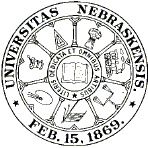
University Studies (University of Nebraska) (1888–1984)
Date of this Version
1938
Citation
UNIVERSITY STUDIES VoL. XXXVIII-Nos. 1-2 (1938)
Abstract
It is appropriate that the University of Nebraska should publish, as a grateful memorial, the principal work which Professor Frye left behind him at his death in 1934. And it is especially appropriate because not only the work itself but the very spirit which animated it was engendered here on the spot, in the sparse leisure of his nearly forty years of teaching. For when he came, in the middle nineties, he had a bent toward science and mathematics; and it was here, paradoxically through friendship with a man of science, Louis Trenchard More, that he turned his face to the Greeks. Through this friendship he later came to know Mr. More's brother, Paul Elmer More, and Irving Babbitt, with whose names his own is associated by the tie of their common humanism. ...
As a contribution to Platonic scholarship the following essays will turn out, I am afraid, to be thoroughly insignificant. If so I am sorry for it; I owe so much to Plato that I should like to make some sort of adequate acknowledgment. But unfortunately I am neither profound nor erudite; while the difficulty of my position is increased by the fact that I am by no means sure of being so good a Platonist as I could wish to be, particularly when I ponder the opinions of many who have no doubt of their own competence. By early reading I was confirmed a realist if not a materialist, a creature whom, for that matter, I continue to hold in greater esteem than an idealist, so stubborn are my youthful prejudices. I grew up with Spencer, Darwin, and Huxley, Bain, Maudsley, and Clifford in my hands-and what expositors they were !-and I still feel more at home in their lowly dwellings than on the dizzy pinnacles of the metaphysicians, whom I have frequented of later years. It was all so plain and solid and settled in those happy days when matter and energy were capable of anything, when consciousness was only a nervous tremor, and thought a mode of motion. Has such a fare come to seem a little juiceless and innutritious? And yet in comparison with the spidery fabrics of the transcendentalists, how rich and varied the picture, how detailed and copious the panorama, in which all the myriad forms of nature took their places, as evolution unrolled its transformations one after another from "an indefinite, incoherent homogeneity" ( if I may borrow the terminology of the Spencerian ᾂπειρον to that triumph of differentiation and! integration, the body and brain of man! What a semblance of order and gradation with every variation catalogued and etiquetted !


Comments
PUBLISHED BY THE UNIVERSITY OF NEBRASKA